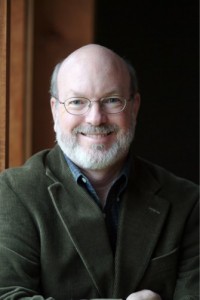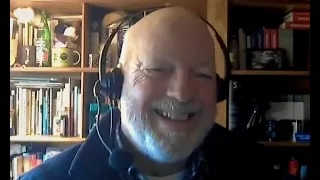 How do you see as your role as a Quaker writer? Or do you consider yourself a writer who is Quaker?
How do you see as your role as a Quaker writer? Or do you consider yourself a writer who is Quaker?
I actually asked my wife which I was and she wouldn’t answer the question. She said “I’m not going there.”
My role as a Quaker writer or writer who’s Quaker is to write good news. My call is not to be an investigative journalist or deal with stories with a dark side or harder edges. My books have tried to be invitations of the best to offer friends who aren’t Friends. I want to introduce Quaker concepts to people outside of Quakerism.
In my short story writing, I want to tell stories where there’s some sort of redemption for the protagonist. I’m not Brett Easton Ellis with all the gloom and doom. I don’t want to be Pollyanna-ish either, or in the style of Norman Vincent Peale, all sweetness and light. My work is about redemption and our hunger for beauty.
Why does it seem like there aren’t many Quaker writers?
A lot of folks don’t make the connection because the writers don’t advertise it as much. In the spirituality field, there is Richard Foster and his son, not formally a Friend but formed by Friend ideals. There’s Phil Gulley, Scott Russell Sanders (mostly known as an environmentalist writer), David Yount from Va., who has a syndicated column and has written 10 or 12 books, one of which was How the Quakers Invented America.
In popular literature, there’s Haven Kimmell, whose draft of ideas for the book A Girl Named Zippy was written at Earlham School of Religion and shot to the New York Times bestseller lists. She also wrote three outstanding novels and a follow-up memoir. She attended a Quaker church in Moreland, Indiana and wrestled with the things she was being taught.
What inspired your latest book, Awaken Your Senses?
I’ve long been fascinated by the distrust of the body among Protestants and even Quakers. I come from an evangelical Quaker background, and we were told we shouldn’t dance, for instance. A lot of what we heard was “Don’t trust your body, your body is evil, Spirit is good and body is bad.” But part of the point of Jesus’s incarnation was that if Jesus came in human form, then he felt, tasted, and smelled. The description that stands out to me is “the sandy grit beneath his toes.”
God didn’t just give us our heads, but that’s where we spend God talk—it’s all about concept, concept, concept. When we moved into the focus on the scientific, we started having issues with the body. We need to recover the sense that our bodies are fearfully and wonderfully made, to think about how they can open us to feeling God in the present moment where we can experience Him. The only place I experience God is in the here and now: the opportunity to use eyes, sights and sounds going on around us, to feel texture and hear somebody’s voice. The original Quakers quaking experienced a whole-body sensation. How can we involve the whole of ourselves on a daily basis? Other faiths do this more intentionally. For example, in the Jewish tradition of Seder, every dish in the meal has a story. What would it be like for us to have a faith story for our food to remind us from whence we came?
Another thing we can do is choose a word to listen for today, and be fully present, similar to the Buddhist idea of mindfulness. There are opportunities to use our senses for prayer every day; for instance, when I worked in my office and heard fire trucks go by, that was an opportunity to hold someone in the Light.
In our present culture, there tends to be no intentional care for the body, as though the body is dead weight.
How does your writing process influence your faith and vice versa?
There’s the old saying, “I write to find out what I think.” For me, it’s “I write to find out what I believe at the deepest levels.”
If I’m going to write 50,000 words on discernment, what can I believe and stand by? If I’m thinking about the power of silence, writing about it helps clarify to me how it works.
Silence ties into the senses. In meeting, people get bent out of shape when they hear noise. We’ve made silence holy and not the reason for silence. Noises are a call to awareness; a baby crying is an opportunity to join a new life. When I heard my grandfather’s cough growing up, it was both a comfort and a time for prayer.
In meeting, there are people who stand up to speak and many Quakers think the old phrase, “O Lord, we’re about to hear that which is just not true.” But we have to recognize that the person is called to be there, and we should be listening and lifting them in prayer. I’m not very good at that, which is why I started the Association of Bad Friends on Facebook. We don’t “care” very much on the Association of Bad Friends—we are only allowed to tell jokes on that page, nothing serious.
How do you reach people who are not Quaker?
I’ve been fortunate to have publishers who believe in my writing and know that there’s interest out there. I’ve blogged about trying to reach out, and I have a lot of Facebook friends who are not Quaker. Some of my most devoted followers are Episcopalian, Catholics, Disciples of Christ, and Baptists.
What pieces of writing are you currently working on?
I’m actually working on four books right now. One is with an agent now; it’s called Friends of God: Wisdom from the Quaker Way, for folks who are not Quaker. Another is Beauty, Truth, Life and Love—Four Essentials for a Faithful Life. Also, one called God is a Verb: Learning a New Way to Pray, which is about what our language tells us about prayer. I’m co-writing that one with Quaker writer Jennie Isbell. It’s based on her workshop of the same title. And the last is about spirituality of place, exploring how the places we live impact our spirituality. Some people might want to live on a farm like I do, but I sometimes want to live in a condo in the city so I don’t have to drive my tractor around so often.
Thanks so much for talking with us, Brent!
To join the Association of Bad Friends, visit facebook.com/groups/assbadfriends.




Comments on Friendsjournal.org may be used in the Forum of the print magazine and may be edited for length and clarity.